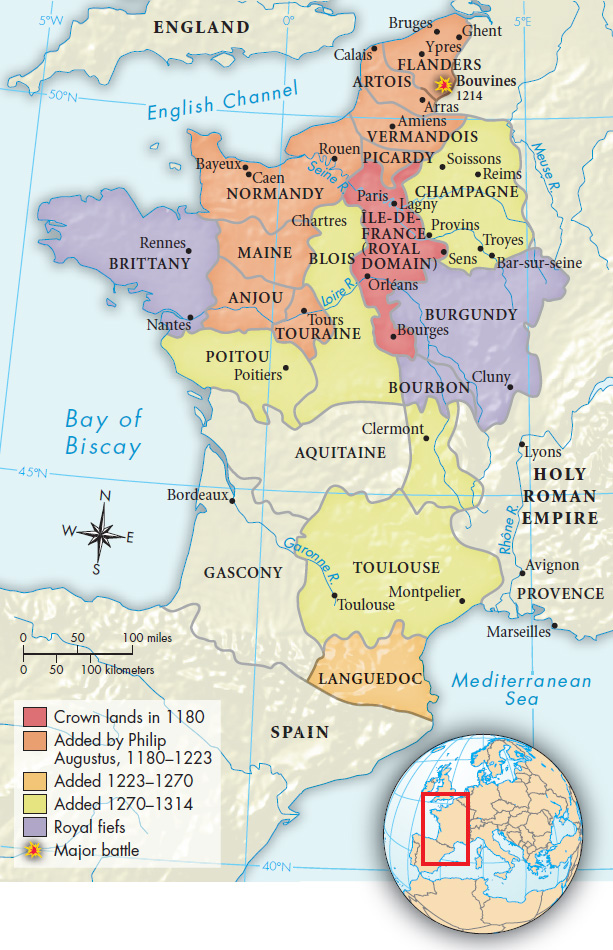A History of Western Society: Printed Page 256
A History of Western Society, Value Edition: Printed Page 263
France

French kings overcame the Angevin threat to expand and increasingly unify their realm. Following the death of the last Carolingian ruler in 987, an assembly of nobles selected Hugh Capet (kah-PAY) as his successor. Soon after his own coronation, Hugh crowned his oldest surviving son Robert as king to ensure the succession and prevent disputes after his death. This broke with the earlier practices of elective kingship or dividing a kingdom among one’s sons, establishing instead the principle of primogeniture (prigh-muh-JEH-nuh-choor), in which the king’s eldest son received the Crown as his rightful inheritance. Primogeniture became the standard pattern of succession in medieval western Europe, and also became an increasingly common pattern of inheritance for noble titles as well as land and other forms of wealth among all social classes.
The Capetian (kuh-PEE-shuhn) kings were weak, but they laid the foundation for later political stability. This stability came slowly. In the early twelfth century France still consisted of a number of virtually independent provinces, and the king of France maintained clear jurisdiction over a relatively small area, the Île-de-France. Over time medieval French kings worked to increase the royal domain and extend their authority over the provinces.
The work of unifying France began under Louis VI’s grandson Philip II (r. 1180–1223), also known as Philip Augustus. He took Normandy by force from King John of England in 1204, and gained other northern provinces as well. In the thirteenth century Philip Augustus’s descendants acquired important holdings in the south. By the end of the thirteenth century most of the provinces of modern France had been added to the royal domain through diplomacy, marriage, war, and inheritance (Map 9.1).
In addition to expanding the royal territory, Philip Augustus devised a method of governing the provinces and providing for communication between the central government in Paris and local communities. Each province retained its own institutions and laws, but royal agents were sent from Paris into the provinces as the king’s official representatives with authority to act for him. These agents were never natives of the provinces to which they were assigned, and they could not own land there. This policy reflected the fundamental principle of French administration that officials should gain their power from their connection to the monarchy, not from their own wealth or local alliances.
Philip Augustus and his successors were slower and less effective than were English kings at setting up an efficient bureau of finance. There was no national survey of property like the Domesday Book to help determine equitable levels of taxation, and French nobles resisted paying any taxes or fees. Not until the fourteenth century, as a result of the Hundred Years’ War, did a national financial bureau emerge — the Chamber of Accounts — and even after that French nobles continued to pay little or no taxes, a problem that would help spark the French Revolution centuries later.